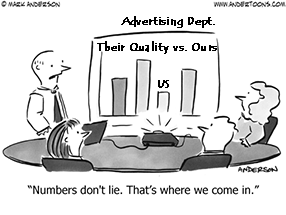 In a world of nonstop competition, the most effective strategy to be the best is to have the most efficient and compelling advertising and marketing for our small businesses. Offline advertising and marketing, such as phone books and billboards, are slowly becoming obsolete to a world gone virtual.
In a world of nonstop competition, the most effective strategy to be the best is to have the most efficient and compelling advertising and marketing for our small businesses. Offline advertising and marketing, such as phone books and billboards, are slowly becoming obsolete to a world gone virtual.
Online advertising has skyrocketed over the last decade, which has created a breeding ground for potential legal problems. [quotes]Small businesses may not even know they are breaking the law with their deceptive advertising. [/quotes]
The Federal Trade Commission believes that when an advertisement contains information that is false or misleading to the average person, it is a violation of the law.
These are some additional places where your marketing practices can run afoul of the law:
- Possible copyright infringement,
- Breaking terms of use,
- Using data that does not belong to you,
- Violations of the can-spam act,
- Making false guarantees, and
- Advertising in a misleading manner.
[quotes]These are serious violations of the law that can result in lawsuits and cost you thousands of dollars.[/quotes]
Copyright Infringement
You may think running a simple Google search for an image or content pertaining to your services/products and copying and using it is okay, but do not be fooled. Just because you can find it online does not mean you can use it! [quotesright]Copyright infringement is a very serious offense[/quotesright] that can land you in a court battle with the person who holds the rights to the image and can carry penalties of $10,000 per use (i.e., one email would cost $10,000; 100 emails would cost $1,000,000.)
Copyright attaches to a work (image, document, logo, drawing, cartoon, work of art, etc.) by default upon its creation and all rights to reproduction and use belong to the creator. That means you cannot republish, use, or modify a work without a "license" from the copyright owner and you must comply with any conditions attached.
Smart Move: Buy your images from a stock image site for a few bucks and get a written license for use of any article, etc. It’s the safe option.
You can find articles for sale by using the search term “articles for sale” or checking out a site like www.fiverr.com. For images, Getty images (www.gettyimages.com) is a high end image site, dreamstime.com is more middle of the road, and there are some really cheap ones out there – but you get what you pay for in terms of quality or time spent finding an image. Here are some suggestions:
[quotes]It is safe to assume that every single image on the internet has a copyright.[/quotes] The Copyright Act places limitations and exclusions on the owner’s copyright. Some images can be used under the Fair Use Act being that the original image, such as a famous painting, is not being “purchased,” just an image of its likeness.
Even when you are covered under the Fair Use Act, the owners of the copyright can continue to impose strict rules regarding terms of use of their image, etc. The original creator of the content still retains full copyright protection and only they can grant you the right to use.
“Advertorial and marketing content” is not as clear online as it is with offline publications. Be smart, if you are unsure that what you are advertising online is against the law, do not post until you are sure it is legal. You can do this through your own research and looking up your local and state laws. It’s cheap insurance to consult an attorney knowledgeable in advertising laws up front and avoid any problems.
Using Data That Does Not Belong to You
Along with the use of the being a violation of the law, [quotesright]many small businesses make the mistake of using data off of social media sites[/quotesright] that does not belong to them. If a small company is collecting data from its followers on a social media site, it is a violation of the law to sell what you find to other companies. If you are solely gathering data and using it to sell your own products or ideas, it is not a violation of the law.
Violations of the CAN-SPAM Act
Emails are widely used throughout small businesses to communicate with employees, customers and potential new business relations. Many small businesses violate a law called the CAN-SPAM Act. [quotes]Canada has an even stricter law called CASL you need to understand and comply with[/quotes] if you email into Canada, Further, Europe has even more laws if you market there.
The CAN-SPAM Act is comprised of several clauses setting out compliance requirement, including those governing Unsubscribing and Content. The Unsubscribing clause is that every email must have an “unsubscribe” option that is discernable and must be fulfilled within 10 days if utilized.
[quotesright]The Content clause refers to the subject lines and the body of the email. [/quotesright] The subject line must match what is within the content of the email.
All the laws in the US, Canada and Europe are very specific about who you are allowed to email to. Just because you have the email address does not mean it’s necessarily legal for you to email that person. Avoid problems and get familiar with these laws if you market by email.
Deceptive email advertising is a huge no-no and is violating the law. Many small businesses may be unaware that sending emails with a false or deceptive subject line to generate visibility and interest to the consumer is against the law. Make your subject interesting but not misleading or deceptive.
Making False Guarantees and Misleading Advertising
[quotes]Making guarantees and promises regarding products and services can sometimes be used by small businesses to generate interest. However,[/quotes] if you make guarantees or claims in your marketing and advertising that you cannot support with proof, that is considered deceptive advertising and a clear violation of the law.
Misleading advertising may seem innocuous and a way to promote traffic to your websites or into your physical place of business, but is subject to legal recourse and potentially big problems for your small business.
[quotesright]The appeal of taking the perceivably easy and cheap or even misleading road in your small business advertising comes with serious legal risk. [/quotesright] A quick review of some key points:
- Remember, that everything online should be viewed as holding a copyright.
- Misleading content and improper email usage can be potential violations of the law.
- Making false guarantees and using information that does not belong to you may seem like a great idea in order to gain attention to the small business, but can land you in some serious hot water.
- Legalities associated with advertising, both online and offline, must be adhered to in order to keep your small business deception-free and in the clear.
If you feel you may have violated advertising laws or have general questions regarding this area, contact and consult with a local attorney experienced in advertising law. Being certain you are not violating the law is far less expensive than defending yourself against a lawsuit or FTC complaint.
Our advice is always to consult with competent legal counsel before you create a problem in areas where you are not well versed or if you are uncertain. It’s cheap “stay in business” insurance…
While this article is US centric, most other countries have similar protections and laws. It is up to you to know what laws apply. It's for this reason we strongly recommend you consult competent legal counsel to be sure you are in compliance will all laws.














